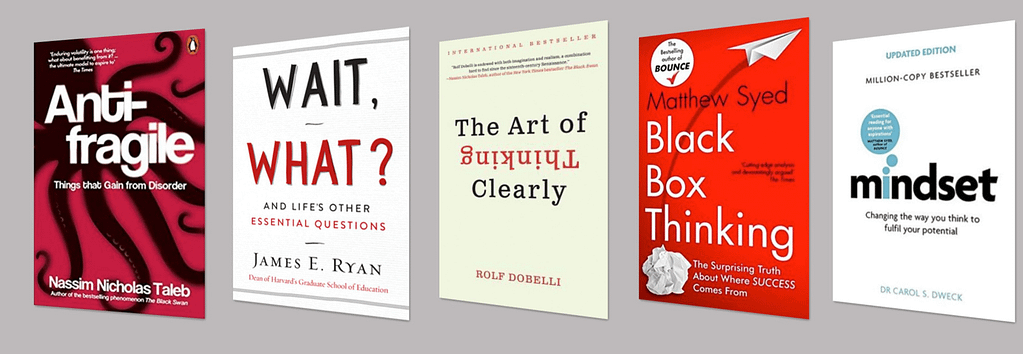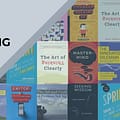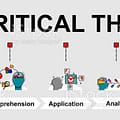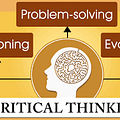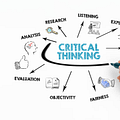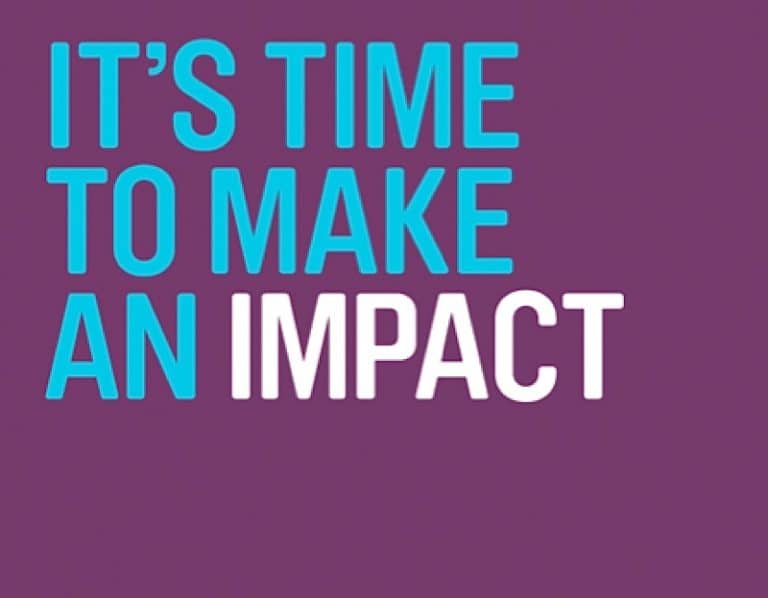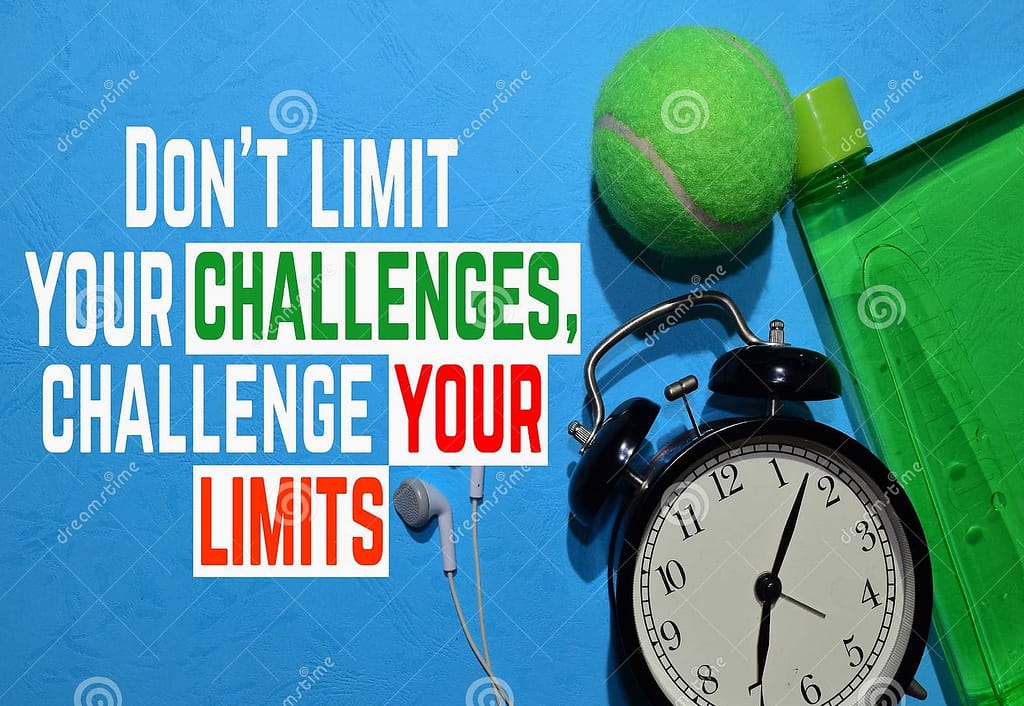Sadhguru: “When your mind is full of assumptions, conclusions, and beliefs, it has no penetration, it just repeats past impressions.”
According to the quote above -the Risk We All Have is Falling in Love with Our Ideas or Beliefs.
If we have made up our minds about an idea or an issue, it’s easy to stop asking for evidence.
And that’s the risk to our thinking, our choices, and our credibility.
Vervago writes:
“It’s easy to fall in love with our pet proposals or our key ideas at work and forget to ask ourselves the tough, precise questions that expose weaknesses in evidence supporting our solutions.”
Critical thinking is important to make well-informed decisions and build your credibility.
Questioning your own beliefs is crucial to building and maintaining your credibility.
“Critical thinking is a kind of thinking in which you question, analyze, interpret, evaluate, and make a judgment about what you read, hear, say, or write.
Good critical thinking is about making reliable judgments based on reliable information.”
According to the World Economic Forum Report, critical thinking is one of the most in-demand career skills employers look for when trying to hire and retain the best employees, and employers believe critical thinking skills will become even more necessary in the coming years.
Leaders and Managers need to employ Critical thinking in the workplace for objective and efficient problem-solving, ultimately reducing costly errors and ensuring that their organization’s resources are used wisely.
Employing critical thinking with team members can connect ideas, spot errors, and inconsistencies, and help inbuild strategies that make them better at their jobs as well as making the best decisions most often.
For this reason, employers may look to hire employees who have strong critical thinking skills.
And to help you become masterful at critical thinking, I have compiled a list of the best books on critical thinking which will help you succeed in your career.
Do you want to become a Brilliant Critical thinker ? Get the 58 Brilliant Critical thinking questions HERE
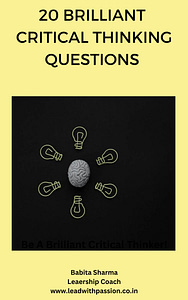
1.THINKING FAST AND SLOW
Daniel Kahneman
It is a lucid and enlightening summary of his life’s work. It will change the way you think about thinking.
Biases, selective reasoning, and distortion are impediments to critical thinking.
There are two systems drive the way we think and make choices, Kahneman explains:
System One is fast, intuitive, and emotional;
System Two is slower, more deliberative, and more logical. Examining how both systems function within the mind.
Kahneman exposes the extraordinary capabilities as well as the biases of fast thinking and the pervasive influence of intuitive impressions on our thoughts and our choices.
He shows where we can trust our intuitions and how we can tap into the benefits of slow thinking, contrasting the two-system view of the mind with the standard model of the rational economic agent.
In this path-breaking book, Kahneman shows how the mind works, and offers practical and enlightening insights into how choices are made in both our business and personal lives – and how we can guard against the mental glitches that often get us into trouble.
GET IT HERE :
KINDLE
HARDCOVER
PAPERBACK
2.THINK AGAIN
Adam M. Grant
Critical thinking is an invaluable skill for an employee to be reliable, progressive, and resilient.
In a rapidly changing world, cognitive skills that might matter more are the ability to rethink and unlearn.
In this book, Adam Grant examines the critical art of rethinking: learning to question your opinions and open other people’s minds, which can position you for excellence at work and wisdom in life.
He accentuates the need for critical thinking skills that help us adapt to a rapidly changing world and influence those around us to bring about meaningful change.
In our daily lives, too many of us favor the comfort of conviction over the discomfort of doubt. The result is that our beliefs get brittle long before our bones.
The brighter we are, the blinder to our limitations we can become.
The reader is taken through the scuffle of rethinking his attitude, the concept of argument literacy, and developing the right tools to unlearn and relearn.
It’s an invitation to let go of views that are no longer serving us well and prize mental flexibility over foolish consistency.
If knowledge is power, knowing what we don’t know is wisdom.
GET IT HERE :
KINDLE
HARDCOVER
PAPERBACK
3.FACTFULLNESS
Hans Rosling with Ola Rosling and Anna Rosling Rönnlund
Factfulness: The stress-reducing habit of only carrying opinions for which you have strong supporting facts.
In this book, the authors suggest that the majority of people tend to believe that the world is in a poorer state than it is.
Moreover, they attribute this worldview to misinformation and a lack of critical thinking skills.
The book reveals certain natural tendencies or biases that distort our perception and highlights ten instincts that hinder us from perceiving the true state of affairs around us.
Our problem is that we don’t know what we don’t know, and even our guesses are informed by unconscious and predictable biases.
It turns out that the world, for all its imperfections, is in a much better state than we might think.
That doesn’t mean there aren’t real concerns.
But when we worry about everything all the time instead of embracing a worldview based on facts, we can lose our ability to focus on the things that threaten us most.
Inspiring and revelatory, filled with lively anecdotes and moving stories, Factfulness is an urgent and essential book that will change the way you see the world and empower you to respond to the crises and opportunities of the future.
GET IT HERE :
KINDLE
HARDCOVER
PAPERBACK
4 CALLING BULL SHIT
Carl Bergstrom and Jevin West
Misinformation, disinformation, and fake news abound and it’s increasingly difficult to know what’s true.
Our media environment has become hyper partisan.
Science is conducted by press release.
Startup culture elevates bullshit to high art.
We are fairly well equipped to spot the sort of old-school bullshit that is based on fancy rhetoric and weasel words, but most of us don’t feel qualified to challenge the avalanche of new-school bullshit presented in the language of math, science, or statistics.
In Calling Bullshit, Professors Carl Bergstrom and Jevin West give us a set of powerful tools to cut through the most intimidating data.
You don’t need a lot of technical expertise to call out problems with data.
Are the numbers or results too good or too dramatic to be true?
Is the claim comparing like with like?
Is it confirming your personal bias?
Drawing on a deep well of expertise in statistics and computational biology, Bergstrom and West exuberantly unpack examples of selection bias and muddled data visualization, distinguish between correlation and causation, and examine the susceptibility of science to modern bullshit.
We have always needed people who call bullshit when necessary, whether within a circle of friends, a community of scholars, or the citizenry of a nation. Now that bullshit has evolved, we need to relearn the art of skepticism.
GET IT HERE :
KINDLE
HARDCOVER
PAPERBACK
5 BLACK BOX THINKING
Matthew Syed
Nobody wants to fail. But in highly complex organizations, success can happen only when we confront our mistakes, learn from our version of a black box, and create a climate where it’s safe to fail.
We all have to endure failure from time to time, whether it’s underperforming at a job interview, flunking an exam, or losing a pickup basketball game.
For a dramatically different approach to failure, look at aviation. Every passenger aircraft in the world is equipped with an almost indestructible black box.
Whenever there’s any sort of mishap, major or minor, the box is opened, the data is analyzed, and experts figure out exactly what went wrong. Then the facts are published and procedures are changed, so the same mistakes won’t happen again.
By applying this method in recent decades, the industry has created an astonishingly good safety record.
Few of us put lives at risk in our daily work, as surgeons and pilots do, but we all have a strong interest in avoiding predictable and preventable errors.
So why don’t we all embrace the aviation approach to failure rather than the healthcare approach?
As Matthew Syed shows in this eye-opening audiobook, the answer is rooted in human psychology and organizational culture.
Syed argues that the most important determinant of success in any field is an acknowledgment of failure and a willingness to engage with it.
GET IT HERE:
KINDLE
HARDCOVER
PAPERBACK
6 CRITICAL THINKING: A BEGINNERS GUIDE TO CRITICAL THINKING, BETTER DECISION MAKING AND PROBLEM SOLVING .
Jennifer Wilson
It is a book that offers insightful tips, as well as steps that are easy to follow for effective problem-solving.
Amazingly, the tips provided are not geared towards solving only one type of problem.
Instead, you can follow them to find solutions to a wide range of challenges.
At the same time, the simple guidelines that the book outlines are not restricted to use by people of only one profession. On the contrary, they apply to all professions and even other spheres of life.
For example, businesspeople are bound to find the techniques of critical thinking described in the book very useful in solving business-related problems, while politicians are likely to find the same techniques handy.
The lessons taught in this book are useful to everyone who looks forward to seeking and finding solutions to simple as well as tough challenges.
Once you have mastered the art of critical thinking and start to apply the skills, you will, very likely, marvel at how much of your precious resources you are capable of saving.
You will also realize that you can streamline systems in a way that cuts down on waste and inefficiencies.
Besides these formal advantages, you will love it when critical thinking begins to come to you as a matter-of-fact process in your day-to-day life.
In this book, you are going to learn:
-
What critical thinking practically is
-
The different parts of your thought process that comprise critical thinking
-
The advantages that you gain from exercising critical thinking
-
How you need to treat your brain so that it is healthy enough to pursue critical thinking
-
The techniques of critical thinking that are best for solving problems
-
Steps to Become an accomplished decision maker
-
Ways to Enhance the critical thinking process
-
Strategies that you can employ in the critical thinking process
-
The best sequence of events to follow when engaging in the critical thinking process
-
The way to make the best decisions in a group setting
-
The best way to frame your questions to improve your proficiency in critical thinking
GET IT HERE :
KINDLE
PAPERBACK
7. CRITICAL THINKING TOOLS FOR TAKING CHARGE OF YOUR PERSONAL AND PROFESSIONAL LIFE
Richard Paul and Linda Elder
Use better thinking to empower yourself, discover opportunities, avoid disastrous mistakes, build wealth, and achieve your biggest goals!
This is your complete, up-to-the-minute blueprint for assessing and improving the way you think about everything – from business decisions to personal relationships.
Drs. Richard W. Paul and Linda Elder, of the Center for Critical Thinking, offer specific guidance for making more intelligent decisions and overcoming the irrationalities and sociocentric limits we all face.
Discover which of the “six stages” of thinking you’re in and learn how to think with clarity, relevance, logic, accuracy, depth, significance, precision, breadth, and fairness.
Master strategic thinking skills you can use everywhere and learn how to critically assess what experts tell you.
Packed with new examples and exercises, this guide won’t just help you think more effectively: it will help you use those skills to empower yourself, discover new opportunities, avoid disastrous mistakes, and grow your wealth.
Above all, it will help you gain the confidence and clarity you need to pursue and achieve your most important goals in life – whatever they are!
GET IT HERE:
KINDLE
HARDCOVER
8. BLINK
Malcolm Gladwell
In Blink, Malcolm Gladwell revolutionizes the way we understand the world within.
Blink is a book about how we think without thinking, about choices that seem to be made in an instant–in the blink of an eye–that aren’t as simple as they seem.
Why are some people brilliant decision-makers, while others are consistently inept?
Why do some people follow their instincts and win, while others end up stumbling into error?
How do our brains work–in the office, in the classroom, in the kitchen, and the bedroom?
And why are the best decisions often those that are impossible to explain to others?
In Blink we meet the psychologist who has learned to predict whether a marriage will last, based on a few minutes of observing a couple; the tennis coach who knows when a player will double-fault before the racket even makes contact with the ball; the antiquities experts who recognize a fake at a glance.
Blink reveals that great decision makers aren’t those who process the most information or spend the most time deliberating, but those who have perfected the art of “thin-slicing”–filtering the very few factors that matter from an overwhelming number of variables.
GET IT HERE:
KINDLE
HARDCOVER
PAPERBACK
9. BRAIN POWER: LEARN TO IMPROVE YOUR THINKING SKILLS
Karl Albrecht
Do you want to expand your mental power?
Think more clearly, logically, and creatively.
Improve your memory?
Solve problems and make decisions more effectively?
Brain Power introduces the six functional thinking abilities you need to become an adaptive, innovative thinker.
As you develop your ability to think on your feet, to isolate and arrange facts, and to avoid logical pitfalls you will see how to use creative problem-solving strategies, both in business and in private life.
With practical exercises to improve your full range of mental capabilities from concentration to intuition, management consultant Karl Albrecht answers all your questions on becoming a more efficient and effective thinker.
Offering a gold mine of ideas and techniques to use in almost any situation, Brain Power provides fascinating illustrations, games, and puzzles that will stimulate and expand your brain power
GET IT HERE :
KINDLE
HARDCOVER
PAPERBACK
10. MISTAKES WERE MADE
Carol Tavris and Elliot Aronson

Renowned social psychologists Carol Tavris and Elliot Aronson take a compelling look into how the brain is wired for self-justification.
This book concludes with an extended discussion of how we can live with dissonance, learn from it, and perhaps, eventually, forgive ourselves.
Why is it so hard to say “I made a mistake”—and believe it?
When we make mistakes, cling to outdated attitudes, or mistreat other people, we must calm the cognitive dissonance that jars our feelings of self-worth.
And so, unconsciously, we create fictions that absolve us of responsibility, restoring our belief that we are smart, moral, and right—a belief that often keeps us on a course that is dumb, immoral, and wrong.
Backed by years of research, Mistakes Were Made (But Not by Me) offers a fascinating explanation of self-justification—how it works, the damage it can cause, and how we can overcome it.
“Every page sparkles with sharp insight and keen observation. Mistakes were made—but not in this book!”—Daniel Gilbert, author of Stumbling on Happiness
GET IT HERE:
KINDLE
PAPERBACK
AUDIO CD
11. PREDICTABLY IRRATIONAL : THE HIDDEN FORCES THAT SHAPE OUR DECISIONS
Dan Ariely
Why do our headaches persist after we take a one-cent aspirin but disappear when we take a fifty-cent aspirin?
Why do we splurge on a lavish meal but cut coupons to save twenty-five cents on a can of soup?
When it comes to making decisions in our lives, we think we’re making smart, rational choices. But are we?
Dan Ariely refutes the common assumption that we behave in fundamentally rational ways.
From drinking coffee to losing weight, from buying a car to choosing a romantic partner, we consistently overpay, underestimate, and procrastinate.
Yet these misguided behaviors are neither random nor senseless.
They’re systematic and predictable—making us predictably irrational.
He combines research with day-to-day examples, to illustrate how emotions, expectations, and societal norms skew judgment and reasoning.
He reveals the most common types of mistakes we are prone to and how they are predictable, systematic, and stem from a lack of critical thinking.
GET IT HERE :
KINDLE
HARDCOVER
PAPERBACK
12. HOW TO THINK ABOUT WEIRD THINGS
Theodore Schick and Lewis Vaughn
This brief, affordable text helps you to think critically, using examples from the weird claims and beliefs that abound in our culture to demonstrate the sound evaluation of any claim.
It explains step-by-step how to sort through reasons, evaluate evidence, and tell when a claim (no matter how strange) is likely to be true.
The emphasis is neither on debunking nor on advocating specific assertions, but on explaining principles of critical thinking that enable readers to evaluate claims for themselves.
The authors focus on types of logical arguments and proofs, making How to Think about Weird Things a versatile supplement for logic, critical thinking, philosophy of science, or any other science appreciation courses.
GET IT HERE:
PAPERBACK
13.ASKING THE RIGHT QUESTIONS
M Neil Browne and Stuart M Keeley
Used in a variety of courses in various disciplines, Asking the Right Questions helps bridge the gap between simply memorizing or blindly accepting information and the greater challenge of critical analysis and synthesis.
Specifically, this concise text teaches how to think critically by exploring the components of arguments–issues, conclusions, reasons, evidence, assumptions, language–and how to spot fallacies and manipulations, and obstacles to critical thinking.
GET IT HERE:
PAPERBACK
14 THE ORGANISED MIND: THINKING STRAIGHT IN THE AGE OF INFORMATION OVERLOAD
Daniel J. Levitin
The information age is drowning us with an unprecedented deluge of data.
At the same time, we’re expected to make more—and faster—decisions about our lives than ever before.
No wonder, then, that the average American reports frequently losing car keys or reading glasses, missing appointments, and feeling worn out by the effort required just to keep up.
But somehow some people become quite accomplished at managing information flow.
In The Organized Mind, Daniel J. Levitin, Ph.D., uses the latest brain science to demonstrate how those people excel—and how readers can use their methods to regain a sense of mastery over the way they organize their homes, workplaces, and time.
The Organized Mind shows how to navigate the churning flood of information in the twenty-first century with the same neuroscientific perspective.
Critical thinking can’t be created in a cluttered mind.
Our modern times forcefully add to the information a lot of junk.
The book will help you sort out and organize your thoughts with the help of the four components of the human attentional system:
-
Mind wandering mode;
-
Central executive mode;
-
Attentional filter;
-
Attentional switch.
You will be able to improve your critical thinking and make better decisions concerning many areas of your life and deal effectively with information overload.
GET IT HERE:
KINDLE
LIBRARY BINDING
PAPERBACK
15. WEAPONIZED LIES :HOW TO THINK CRITICALLY IN THE POST TRUTH -ERA
Daniel Levitin
From this book, you’ll learn how to think critically and avoid being manipulated by things like misleading statistics and graphics, extreme views, or fake news.
This book teaches you to see the truth and helps you improve your critical thinking, providing you with a lot of food for thought.
Here are the fundamental lessons in critical thinking that we need to know and share now.
Investigating numerical misinformation, Daniel Levitin shows how mishandled statistics and graphs can give a grossly distorted perspective and lead us to terrible decisions.
You will learn how to read statistics and data to find out what lurks underneath and make a more objective analysis
Wordy arguments, on the other hand, can easily be persuasive as they drift away from the facts in an appealing yet misguided way. You will learn how to assess the information you receive from experts, understand the difference between incidence and prevalence, risk perceptions, and probabilistic thinking.
The steps we can take to better evaluate news, advertisements, and reports are detailed.
Ultimately, Levitin turns to what underlies our ability to determine if something is true or false: the scientific method. He grapples with the limits of what we can and cannot know.
This book enables us to avoid the extremes of passive gullibility and cynical rejection.
As Levitin attests: Truth matters. A post-truth era is an era of willful irrationality, reversing all the great advances humankind has made. Euphemisms like “fringe theories”, “extreme views”, “alt truth”, and even “fake news” can be dangerous.
Let’s call lies what they are and catch those making them in the act.
GET IT HERE :
HARDCOVER
PAPERBACK
16. THE DEMON-HAUNTED WORLD
Carl Sagan
How can we make intelligent decisions about our increasingly technology-driven lives if we don’t understand the difference between the myths of pseudoscience and the testable hypotheses of science?
Pulitzer Prize-winning author and distinguished astronomer Carl Sagan argue that scientific thinking is critical not only to the pursuit of truth but to the very well-being of our democratic institutions.
Casting a wide net through history and culture, Sagan examines and authoritatively debunks such celebrated fallacies of the past as witchcraft, faith healing, demons, and UFOs.
And yet, disturbingly, in today’s so-called information age, pseudoscience is burgeoning with stories of alien abduction, channeling past lives, and communal hallucinations commanding growing attention and respect.
As Sagan demonstrates with lucid eloquence, the siren song of unreason is not just a cultural wrong turn but a dangerous plunge into darkness that threatens our most basic freedoms.
GET IT HERE:
KINDLE
HARDCOVER
PAPERBACK
17. WAIT WHAT
James E. Ryan
Whether we’re in the boardroom or the classroom, we spend far too much time and energy looking for the right answer.
But the truth is that questions are just as important as answers, often more so.
If you ask the wrong question, for instance, you’re guaranteed to get the wrong answer.
A good question, on the other hand, inspires a good answer and, in the process, invites deeper understanding and more meaningful connections between people.
Asking yourself and others the right questions helps you make informed decisions and decisive action.
Knowing how to formulate, address, and deliver the right questions prevents the scope for misunderstandings and misinterpretations; asking the wrong questions will most probably give you a wrong answer.
Asking a good question requires us to move beyond what we think we know about an issue or a person to explore the difficult and the unknown, the awkward, and even the unpleasant.
In Wait, What?, Jim Ryan, celebrates the art of asking—and answering—good questions.
Five questions in particular:
Wait, what?;
I wonder…?
Couldn’t we at least…?;
How can I help?; and
What truly matters?
Using examples from politics, history, popular culture, and social movements, as well as his own life, Ryan demonstrates how these essential inquiries generate understanding, spark curiosity, initiate progress, fortify relationships, and draw our attention to the important things in life—from the Supreme Court to Fenway Park
.
By regularly asking these five essential questions, Ryan promises, we will be better able to answer life’s most important question: “And did you get what you wanted out of life, even so?”
You will feel more courageous; after all, asking questions requires courage.
At once hilarious and illuminating, poignant and surprising, Wait, What? is an inspiring book of wisdom that will forever change the way you think about questions.
GET IT HERE:
KINDLE
HARDCOVER
AUDIO CD
18. THE 5 ELEMENTS OF EFFECTIVE THINKING
Edward B Burger and Michael Starbird
The 5 Elements of Effective Thinking presents practical, lively, and inspiring ways for you to become more successful through better thinking.
The idea is simple: You can learn how to think far better by adopting specific strategies.
Brilliant people aren’t a special breed―they just use their minds differently.
By using the straightforward and thought-provoking techniques in The 5 Elements of Effective Thinking, you will regularly find imaginative solutions to difficult challenges, and you will discover new ways of looking at your world and yourself―revealing previously hidden opportunities.
The book offers real-life stories, explicit action items, and concrete methods that allow you to attain a deeper understanding of any issue, exploit the power of failure as a step toward success, develop a habit of creating probing questions, see the world of ideas as an ever-flowing stream of thought, and embrace the uplifting reality that we are all capable of change.
No matter who you are, the practical mindsets introduced in the book will empower you to realize any goal in a more creative, intelligent, and effective manner.
Filled with engaging examples that unlock truths about thinking in every walk of life,
The 5 Elements of Effective Thinking is written for all who want to reach their fullest potential―including students, parents, teachers, businesspeople, professionals, athletes, artists, leaders, and lifelong learners.
Whenever you are stuck, need a new idea, or want to learn and grow, The 5 Elements of Effective Thinking will inspire and guide you on your way.
GET IT HERE:
KINDLE
HARDCOVER
AUDIO CD
CONCLUSION
The aim of improving your skill of critical thinking is to get to the right answer and to make the right decisions and choices for yourself and others.
Critical thinking helps you to improve the quality of your decisions and judgments, and reevaluate your beliefs objectively.
Mastering critical thinking is important in today’s ever-changing workplaces especially because you have to make tons of decisions every day; think and come to the right conclusion fast; solve your problems and issues; carefully weigh the facts and information you receive from many sources, re-evaluate your strategies, beliefs, and habits from time to time.
And to help you master these skills the books above are from the very best masters in critical thinking.
What book did you find most interesting to hone your critical thinking skill?
What are you considering to add to your collection right now?
Share your thoughts below.
Babita Sharma
Leadership Coach
www.leadwithpassion.co.in

